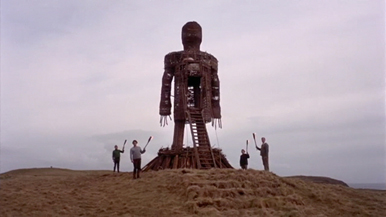Viking Night: The Wicker Man
By Bruce Hall
July 8, 2014
It’s comforting to have all the answers, isn’t it? It feels good to have 100 percent certainty that you are always right and everyone else is always wrong. You have it all figured out. To you, the meaning of life is obvious and anyone who disagrees with you is a threat to everything you believe in. It’s a big job, being better than everyone else, so you might as well make some money at it. Some people go into talk radio, or politics or worse yet - become movie critics. Others become cops, because it’s the only respectable job that pays you to push other people around. It’s not that you aren’t a good person; it’s that your brand of goodness is a particularly exclusive one.
And that my friends, is an apt description of Sergeant Neil Howie (Edward Woodward). He’s a police officer who’s so by the book, at times he appears unable to bend his spine. He arrives by seaplane at the remote Scottish island of Summerisle, acting on an anonymous tip that a local child named Rowan Morrison has gone missing. He’s greeted at the dock by the town elders, who claim no knowledge of the child. Summerisle is a small, close knit community, so undaunted, Howie begins his investigation. Though already suspicious, he’s unprepared to hear the girl’s own mother deny her daughter’s existence.
It’s pretty normal for the parent of every teenager to at some point claim they have no child. But in this case, Howie is just more convinced that something ominous is happening on the island. But there’s also something dirty going on. As Howie traverses the island and interacts with the locals, he finds that sex – talking about it, learning about it or just pitching your tent wherever you feel like it – is an integral part of this society. When the Sergeant rents a room in town, the innkeeper’s daughter throws herself at him while the drunken patrons sing a sexy shanty about boning the inkeeper’s daughter. Summerisle is a Pagan colony where the Old Gods are worshipped and everyone feels at one with nature, meaning they like to have orgies in the park.
Outraged, Howie expands his investigation, angrily promising to report each and every single dong he sees while on the island. He suspects a cover up, but the deeper he investigates, the more everyone starts talking to him, except now they all speak in the same cryptic, mind blowing riddles as Jedi Knights. Is everyone just messing with the out-of-towner? Are Howie’s offended morals making him see things that aren’t there? The Sergeant is a very serious, dedicated man caught up in something that, to him, is an impossible whirlwind of insanity. And Woodward is outstanding at conveying it. His heroic features and boarding school posture ooze not merely authority; they ooze the regal bearing of someone who will not be jacked with - because his badge actually opens up into a tiny little bible.
On one side, you have a man so honorable he’s almost a walking anachronism. On the other, you have a society practicing ancient rituals that most modern people would consider beyond degenerate. In fact when Howe finally meets Lord Summerisle himself (Christopher Lee), one speaks in measured, tolerant tones while the other sputters like a busted sea pump. There’s not a lot of middle ground between a 40-year-old man who’s never touched a boob and a guy who has naked children teenage girls dancing around a bonfire on his front lawn. Howie actually comes across as a sympathetic character – he’s a genuinely decent man who genuinely cares about finding a missing child, and he can’t understand why no one else is taking it seriously.
Lee is borderline astounding. Is he disarming? Is he diabolical? Is his rich, resonant baritone like enjoying hot buttered rum in front of a blazing fire in an ugly ski sweater? Hell yes. But the most effective character of all is the vibe. The Wicker Man begins as a procedural, becomes the sexiest Twilight Zone episode ever, and ends as one of the most unforgettable horror-thrillers of the 1970s. The people of Summerisle, their quaint village, outmoded customs and picturesque backdrop provide a rich environment for Howie and his new acquaintances to explore the limits of tolerance, and the danger in allowing ideology to obscure reality. When someone lacks the ability to view themselves objectively, they are far more vulnerable to deception. It’s a horrifying lesson The Wicker Man brings into stark relief with a delightfully disturbing ending that will haunt you for days.
Unless you’re better than everyone else, then you’ll just become a movie critic, and tell everyone else how to feel about it.
|
|
|
|




